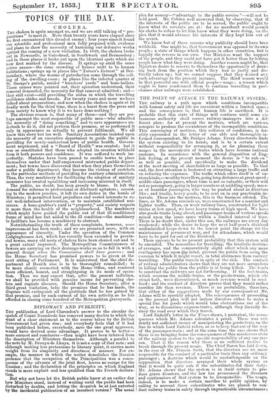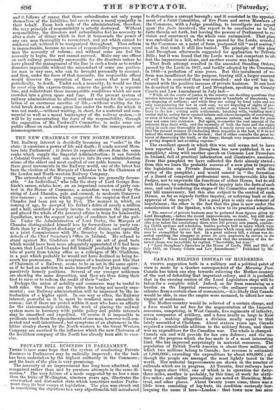THE POINT OF ATTACK IN THE RAILWAY SYSTEM. THE railway
is a path upon which conditions incompatible with human safety and life arc coexistent within a limited space ; and the consequence is, that human life is sacrificed. It is probable that this state of things will continue until some ex- traneous authority shall coerce railway-managers into a dif- ferent plan ; for at present the motives, which are various, conspire to produce the coexistence of the incompatible conditions. This converging of motives, this collision of conditions, is for- cibly expounded in the letter of our able and thoroughly-in- formed correspondent, Mr. Bridges Adams. Every directorate finds the system existing to its hands, and is to a certain extent without responsibility for arranging it, or for planning those usages in the movements of trains which have become national customs. In accordance with the general disposition of Eng- lish feeling, at the present moment the desire is " to rub on, ' as well as possible, and specifically to make the dividend at the next meeting of shareholders as large as possible. To that end, the first attention is bestowed on attracting a large traffic and on reducing the expenses. The traffic which offers itself is of va- rious kinds,—wealthy travellers, going long distances at great speed ; middle-class passengers, whose time is not so valuable, or their will not so peremptory, going in larger numbers at middling speed; mass- es of humbler passengers, who may be pushed about as directors like ; and finally, heavy goods, to be sent on in any practicable in- tervals. These are the motives, this is the business offered. The lines, as Mr. Adams reminds us, were constructed for a scantier and lighter traffic. Thus, on weak railway lines, constructed for light trains at low speed, we have heavy trains at high speed. We have also goods-trains lying about, and passenger-trains of various speeds. mixed upon the same space within a limited interval of time. There is no doubt that, under this use, the railways are every day weakened ; while the desire to keep the next half-year's dividend undiminished keeps down to the lowest point the charge for the maintenance of permanent way, and for attendance, which would have to be paid for out of the dividend.
There appears to be no present probability that this system will be amended. The necessities for travelling, the fatalistic doctrine of averages, and the comparatively slight effect which any mere contingency has upon4e mind, prevent the public from using the coercion to which it might resort, in total abstinence from railway travelling. The public travels in spite of the risk. The conduct of railway administrators shows that they are not more scrupulous in killing the public than the public is in being killed. The funds to construct the railways are not forthcoming. If the fast-trains, which overrun the middle-trains, or the goods-trains, which ob- struct both, were discontinued, so much revenue would be semi liced ; and the conduct of directors proves that they would rather sacrifice life than revenue. There is no probability, therefore, that either of the suggestions made by our correspondent Mr. Adams will be speedily adopted. The consequences of proceeding on the present plan will not induce directors either to make a special line for goods which would take obstructions out of the way, or to discontinue express-trains, although they literally de- stroy the road over which they travel.
Lord Enfield's letter in the Times shows, a posteriori, the conse- quences which Mr. Adams calculates d priori. There was evi- dently not sufficient means of manipulating the goods-train on the line to which Lord Enfield refers, so as to keep that out of the way of the passenger-train ; and at the same time the case shows that there is no bringing home the consequences of this murderous state of the railway system to the specific responsibility of any one per- son. That is the reason why there is no sufficient motive to break through the present usage. The Chief Baron has laid down, in the case of Mr. Francis Scott, that the directors are no more responsible for the conduct of a particular train than any ordinary passenger ; a doctrine which would be unchallengeable on the supposition that directors arranged their whole system so that it would be quite safe if the subordinates did their duty. Mr. Adams shows that the system is in itself certain to pro- duee grave disasters, and the law has pronounced the directors and continuators of that system to be irresponsible. The usage, indeed, is to make a certain sacrifice to publio opinion, by calling to account those subordinates who are placed to con- duct railway trains in safety through impracticable circumstances ; and it follows of course that those subordinates not only purge themselves of the liabilities, but create even a moral sympathy in their behalf. From both ends of the administration, therefore, the very principle of responsibility is utterly destroyed. Without responsibility, the directors and subordinates feel no necessity to alter a state of things which in fact it transcends the power of any one man thoroughly to reconstruct, and yet which cannot be rendered safe without it be reorganized throughout. Thus reform is impracticable, because no sense of responsibility impresses upon men the necessity of reform ; and without some one feel the necessity to begin, the rest cannot succeed. Make any one officer on each railway personally answerable for the disasters unless he have placed the management of the line in such a train as to render disasters impossible without the misconduct of sonic one particu- lar man in any case who can be brought personally to account; and then, under the force of that necessity, the responsible officer would discover the operation of those causes that now lead, periodically, to death. Under such a necessity, he would see that he must stop the express-trains, remove the goods to a separate line, and redistribute those incompatible conditions which are now crowded into a given space and time. If the present system of railway administration be altered without waiting for the accumu- lation of an enormous sacrifice of life,—without waiting for the total break-down of some great line under the traffic for which it was not made,—without waiting, in short, for a material and com- mercial as well as a moral bankruptcy of the railway system,—it will be by concentrating the force of the responsibility, through the suggestion of Mr. Cardwelrs Committee, to make some one public officer on each railway answerable for the consequences of mismanagement.



























 Previous page
Previous page